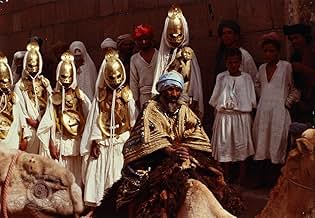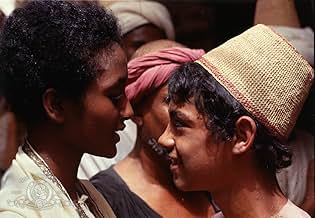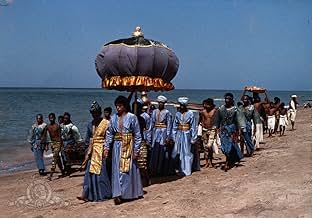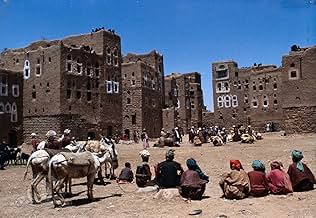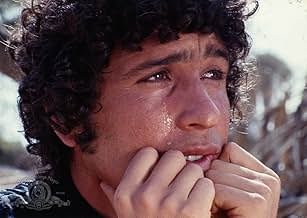AVALIAÇÃO DA IMDb
6,6/10
9,6 mil
SUA AVALIAÇÃO
Um jovem é escolhido por uma bela escrava para ser seu novo mestre; ela é sequestrada e eles devem procurar um ao outro. As histórias são contadas dentro de histórias; amor, viagens e os cap... Ler tudoUm jovem é escolhido por uma bela escrava para ser seu novo mestre; ela é sequestrada e eles devem procurar um ao outro. As histórias são contadas dentro de histórias; amor, viagens e os caprichos do destino.Um jovem é escolhido por uma bela escrava para ser seu novo mestre; ela é sequestrada e eles devem procurar um ao outro. As histórias são contadas dentro de histórias; amor, viagens e os caprichos do destino.
- Direção
- Roteirista
- Artistas
- Prêmios
- 1 vitória e 3 indicações no total
Tessa Bouché
- Aziza
- (as Tessa Bouche')
Margareth Clémenti
- Madre di Aziz
- (as Margaret Clementi)
Elisabetta Genovese
- Munis
- (as Elisabetta Vito Genovese)
Avaliações em destaque
There's a lot of potential moral quandaries associated with this movie: real animals getting killed, disturbingly young actors engaging in simulated sex acts, some unsettling adult themes and the general feeling of heat and stench conveyed by the flies and sweat. Then there's Pasolini's signature shaky camera-work and rough acting from non-actors.
If you can get past the thirty minute mark, and a few boring sequences, you may find yourself like I was charmed enough by its incidents that you keep watching to the end, waiting to see what surprise lay in store next.
It features some wonderful moments that suit the mythical source material, and as plentiful supply of penises there ever was, certainly if you count unique penises, I reckon this could beat most pornos, if that's your cup of tea. They're normally just sitting there, bear in mind, but often they're doing other things.
Not exactly family fare, but for those seeking a bit of weirdness, this may just hit the right spot. It would probably be hilarious if dubbed over Kung Pow style. (Or What's Up Tigerlilly style if you prefer).
5/10 for me.
If you can get past the thirty minute mark, and a few boring sequences, you may find yourself like I was charmed enough by its incidents that you keep watching to the end, waiting to see what surprise lay in store next.
It features some wonderful moments that suit the mythical source material, and as plentiful supply of penises there ever was, certainly if you count unique penises, I reckon this could beat most pornos, if that's your cup of tea. They're normally just sitting there, bear in mind, but often they're doing other things.
Not exactly family fare, but for those seeking a bit of weirdness, this may just hit the right spot. It would probably be hilarious if dubbed over Kung Pow style. (Or What's Up Tigerlilly style if you prefer).
5/10 for me.
Whether or not you like some (or just respond positively to some) of Pier Paolo Pasolini's work, or you don't, will depend on how much one can take of provocative subject matter put forward in an upfront manner. For me, he's a director that can go both ways, be it completely muddled and pretentious (Teorema) or almost boring in its S&M tactics of twisted satire (Salo), or actually dramatically engaging (Mamma Roma), and he's never someone who takes the easy road. Arabian Nights is another one, as part of a 'trilogy' of films adapted from famous, erotically-laced works of stories that have scandalized for centuries (the others the Decameron and Canterbury Nights). Once again, Pasolini has a lot of people in his film that aren't actors, or even real extras- sometimes some people will just pop out, or a bunch of kids will run around, and they're plucked right from the scenery. If authentic, film fans, is what you want, Pasonili gives it, in all of the style of a guy out to shoot a documentary on the people in these settings and gets (pleasantly) sidetracked by a bunch of crazy-tragic stories of love and lust in the desert.
As if done in a pre-Pulp Fiction attempt at non-linear storytelling, we get the tale of Zumurrud (Ines Pellegini) and Nur ed din (Franco Merli), one a slave who is bought by the most innocent looking kid in the bunch of bidders. They fall in love, the wise young girl and naive grunt, but they get separated after she gets sold to another man. She escapes, but becomes the unwitting king after she is mistaken for a man. Meanwhile, her young little man is calling after her/him, and getting into his own trouble. Through this framework, we get other stories told of love lost and scrambled; a sad and silly story of a man who's engaged to his cousin, and is thwarted by a mysterious woman who gets his attention, which leads him down a path of semantics (yes, semantics, poetry-style) and sex, leaving his much caring cousin behind. Then there's the man who woos a woman who is under the ownership of a demon, and once their affair is discovered some unexpected things happen via the Demon (Franco Citti, maybe the most bad-ass character in the film despite the surreal-aspect of the showdown). And then one more story, which, hmm....
I could go on making descriptions, but then this wouldn't be much of a review of praise of the picture. Suffice to say it's one of Pasolini's strongest directed efforts, where he's surefire in his consistent usage of the hand-held lens, getting his actors to look sincere through dialog that is half ripped-from-the-pages and half with the sensibility of Pasolini as a poet (yes, I went there in the whole 'he's a poet' thing, but he is in a rough-edged and melodramatic timing and flow). He's also going for an interesting combo; neo-realist settings for a good chunk of the picture, set in and around real locations in areas that don't need much production design, and an epic sweep that includes many extras, some special effects at times (and how about that lion!), and extravagant costumes.
I also liked- if not loved- how Pasonili dealt with sex and more-so the human body itself. It would probably rightfully get an NC-17 if released today in America, and got an X when released in 1980. The dreaded 'thing' of a man is revealed about as often as a cut-away to a master shot of a building. Everything, in fact, is filmed frankly, without the style that tip-toes around the starkness of two people embraced and naked. But it's also not pornographic either; if anything Pasolini perhaps doesn't direct far enough with the sex, as one body just lays still on top of another. There's a specific intent to dealing with sexuality in this world that respects lust and desire from the original text without making it blatant- only in one big instance, involving the fate of the man from the cousin story (the one with Aziz I think) revels in the horror of sex that was delved tenfold in Salo. Add to this the exquisite score from Ennio Morricone, who enriches any scene his score pops up, as a mandolin strings away and the strings rise with just a hint of the sentimental. Without Morricone, in fact, it might not be as emotional a film, when need be.
And lest not forget Arabian Nights can be strangely comical, where Pasolini throws it back at the audience that he knows he's going (rightfully) into the surreal. Like with the story of the Demon and the fate of a man transformed as a chimpanzee, or the vision with the lion, or even the dialog in the pool with the three girls and the man, which is humorous while keeping a tongue-in-cheek. And there's even some good jokes to come out of the obvious step of having Zummurrud as the 'King' when it's clear as day from the Italian dubbing that he's the 'she', so to speak, as it stretches out into a final scene where lovers are united and things are as they should be, however much the director is thumbing his nose at power and sex and the dealings of the heart with organs. Arabian Nights probably couldn't be made today, but could anyone else but Pasolini make it anyway? There's daring in this film, and through the exotic exteriors and sets we see a filmmaker working along like there's nothing else to stop him, for better or worse. This time for the better.
As if done in a pre-Pulp Fiction attempt at non-linear storytelling, we get the tale of Zumurrud (Ines Pellegini) and Nur ed din (Franco Merli), one a slave who is bought by the most innocent looking kid in the bunch of bidders. They fall in love, the wise young girl and naive grunt, but they get separated after she gets sold to another man. She escapes, but becomes the unwitting king after she is mistaken for a man. Meanwhile, her young little man is calling after her/him, and getting into his own trouble. Through this framework, we get other stories told of love lost and scrambled; a sad and silly story of a man who's engaged to his cousin, and is thwarted by a mysterious woman who gets his attention, which leads him down a path of semantics (yes, semantics, poetry-style) and sex, leaving his much caring cousin behind. Then there's the man who woos a woman who is under the ownership of a demon, and once their affair is discovered some unexpected things happen via the Demon (Franco Citti, maybe the most bad-ass character in the film despite the surreal-aspect of the showdown). And then one more story, which, hmm....
I could go on making descriptions, but then this wouldn't be much of a review of praise of the picture. Suffice to say it's one of Pasolini's strongest directed efforts, where he's surefire in his consistent usage of the hand-held lens, getting his actors to look sincere through dialog that is half ripped-from-the-pages and half with the sensibility of Pasolini as a poet (yes, I went there in the whole 'he's a poet' thing, but he is in a rough-edged and melodramatic timing and flow). He's also going for an interesting combo; neo-realist settings for a good chunk of the picture, set in and around real locations in areas that don't need much production design, and an epic sweep that includes many extras, some special effects at times (and how about that lion!), and extravagant costumes.
I also liked- if not loved- how Pasonili dealt with sex and more-so the human body itself. It would probably rightfully get an NC-17 if released today in America, and got an X when released in 1980. The dreaded 'thing' of a man is revealed about as often as a cut-away to a master shot of a building. Everything, in fact, is filmed frankly, without the style that tip-toes around the starkness of two people embraced and naked. But it's also not pornographic either; if anything Pasolini perhaps doesn't direct far enough with the sex, as one body just lays still on top of another. There's a specific intent to dealing with sexuality in this world that respects lust and desire from the original text without making it blatant- only in one big instance, involving the fate of the man from the cousin story (the one with Aziz I think) revels in the horror of sex that was delved tenfold in Salo. Add to this the exquisite score from Ennio Morricone, who enriches any scene his score pops up, as a mandolin strings away and the strings rise with just a hint of the sentimental. Without Morricone, in fact, it might not be as emotional a film, when need be.
And lest not forget Arabian Nights can be strangely comical, where Pasolini throws it back at the audience that he knows he's going (rightfully) into the surreal. Like with the story of the Demon and the fate of a man transformed as a chimpanzee, or the vision with the lion, or even the dialog in the pool with the three girls and the man, which is humorous while keeping a tongue-in-cheek. And there's even some good jokes to come out of the obvious step of having Zummurrud as the 'King' when it's clear as day from the Italian dubbing that he's the 'she', so to speak, as it stretches out into a final scene where lovers are united and things are as they should be, however much the director is thumbing his nose at power and sex and the dealings of the heart with organs. Arabian Nights probably couldn't be made today, but could anyone else but Pasolini make it anyway? There's daring in this film, and through the exotic exteriors and sets we see a filmmaker working along like there's nothing else to stop him, for better or worse. This time for the better.
"Fiore delle mille e una notte" ,which won special prize at CANNES 1974 is the third part of what Pasolini called the trilogy of life which encompasses "il decameron" (1971) and" racconti di Canterbury" (1972). It's the most accessible of all Pasolini movies ,and weren't it for the numerous nudities,it would appeal to large audience.
This must be the script:it's much better than the two first films because the story is built à la Shéhérazade ,with plots ,subplots and subsubplots which fit into each other;and although sex is the main vector,it features enough twists to sustain the interest throughout.It does not forget magic (the segment which features Ninetto Davoli,Pasolini's favorite actor,uses a lot of symbols)and mystery (the adolescent who must be killed when he's fifteen ).Humor is less vulgar than in "di racconti di Canterbury" The little riddle "the aromatic grass of the fields" "the slit pomegranate" and "the inn of the warm welcome " is witty.
Little did we know that Pasolini would follow his trilogy of life with the most depressing work ever made :"Salo" (1975).
This must be the script:it's much better than the two first films because the story is built à la Shéhérazade ,with plots ,subplots and subsubplots which fit into each other;and although sex is the main vector,it features enough twists to sustain the interest throughout.It does not forget magic (the segment which features Ninetto Davoli,Pasolini's favorite actor,uses a lot of symbols)and mystery (the adolescent who must be killed when he's fifteen ).Humor is less vulgar than in "di racconti di Canterbury" The little riddle "the aromatic grass of the fields" "the slit pomegranate" and "the inn of the warm welcome " is witty.
Little did we know that Pasolini would follow his trilogy of life with the most depressing work ever made :"Salo" (1975).
This very unique rendering of the Arabian Nights was filmed in natural locations in places as diverse as Ethiopia, Yemen, Iran and Nepal. The beauty of the landscapes is breathtaking, and makes the film an incredible voyage into time and space.
Please note that this movie is an explicitly erotic one, but one tends to forget that the original Arabian Nights were very much so, and not fairy tales for children. It is certainly difficult to make an erotic masterpiece, as sexual content does not make a movie better. It rather tends generally to get crassly exploitative, and rarely beautiful. There is plenty of sex in this movie, but it is depicted in a natural, feel-good and intelligent way that is rarely to be found elsewhere.
By the way, this movie should be seen again at the light of nowadays controversies. The Muslim world was far from always having been puritanical, and the sensual poetry that is rendered here is not Pasolini's invention. It is the faithful reflection of a hedonistic Orient that produced for instance poet Omar Khayyam as well as the original Arabian Nights. It is also a film about love, the most gripping part being the tragic and mysterious tale of Aziz and Aziza.
Don't expect any Aladdin or Ali Baba stuff here, you already figured this out. Anyway, it would be impossible to make a complete film version of the Arabian Nights, so this work just shows a few excerpts combined together (the Italian title is in in fact "the flower of the Arabian Nights"). However, the trend of the tales is respected in the sense that all the stories are interwoven into one another and eventually come back to the original plot.
The atmosphere of ancient Orient is rendered in a style that is lightyears away from usual clichés, and in an incredibly authentic and physical way. At times, you get the illusion that you feel the blazing sun on your skin, that you can smell the exotic vegetation, the sand, the noisy bazaars full of spices. There are a few flaws though : visible cutting, unadapted stances of classical music. The use of non professional actors was common for Pasolini, and gives a pleasant feeling of naive freshness.
The movie is probably Pasolini's best, and belongs to the "trilogy of Life" that included "the Decameron" and "the Canterbury tales", also literature classics. But much more than the two others, this movie is an ode to life. Hard to suspect that Pasolini's last work would be an ode to death. "Arabian Nights" belongs to the golden age of Italian cinema, that was incredibly prolific and innovative in the sixties and seventies.
All in all, not a family movie, but if you are curious and open-minded, get ready for a beautiful journey.
Please note that this movie is an explicitly erotic one, but one tends to forget that the original Arabian Nights were very much so, and not fairy tales for children. It is certainly difficult to make an erotic masterpiece, as sexual content does not make a movie better. It rather tends generally to get crassly exploitative, and rarely beautiful. There is plenty of sex in this movie, but it is depicted in a natural, feel-good and intelligent way that is rarely to be found elsewhere.
By the way, this movie should be seen again at the light of nowadays controversies. The Muslim world was far from always having been puritanical, and the sensual poetry that is rendered here is not Pasolini's invention. It is the faithful reflection of a hedonistic Orient that produced for instance poet Omar Khayyam as well as the original Arabian Nights. It is also a film about love, the most gripping part being the tragic and mysterious tale of Aziz and Aziza.
Don't expect any Aladdin or Ali Baba stuff here, you already figured this out. Anyway, it would be impossible to make a complete film version of the Arabian Nights, so this work just shows a few excerpts combined together (the Italian title is in in fact "the flower of the Arabian Nights"). However, the trend of the tales is respected in the sense that all the stories are interwoven into one another and eventually come back to the original plot.
The atmosphere of ancient Orient is rendered in a style that is lightyears away from usual clichés, and in an incredibly authentic and physical way. At times, you get the illusion that you feel the blazing sun on your skin, that you can smell the exotic vegetation, the sand, the noisy bazaars full of spices. There are a few flaws though : visible cutting, unadapted stances of classical music. The use of non professional actors was common for Pasolini, and gives a pleasant feeling of naive freshness.
The movie is probably Pasolini's best, and belongs to the "trilogy of Life" that included "the Decameron" and "the Canterbury tales", also literature classics. But much more than the two others, this movie is an ode to life. Hard to suspect that Pasolini's last work would be an ode to death. "Arabian Nights" belongs to the golden age of Italian cinema, that was incredibly prolific and innovative in the sixties and seventies.
All in all, not a family movie, but if you are curious and open-minded, get ready for a beautiful journey.
Surely there's a lot to admire and enjoy in this movie: the settings and costumes are extremely colourful, the locations exotic, at times almost dreamlike, and at several times there are stunning mass-scenes. All this makes watching it a dazzling and overwhelming experience. But - at least with me - this movie also evokes bewilderment, confusion and irritation.
Using local amateurs can give a feeling of authenticity, but here is such an abundance of amateurism that it gets on your nerves. Many of the cast don't seem to act at all, but just obediently follow orders: they either loiter about or run around frantically, they grin sheepishly or feign to cry, they rattle their obviously later dubbed Italian lines in mostly loud and high-pitched voices, and then sooner or later (mostly sooner) they take their clothes off, that's about it. The musical score is very strange and uneven, at some parts beautiful music (Morricone!), at other times there are long streches of bland silence. Strangely enough never Arabian-sounding music, which couldn't have been hard to find around the locations where they filmed.
I don't mind a bit of nudity and sex, but this is really way over the top: every guy that pops around the corner is stark naked within a minute or two and runs around like that for the rest of the film. And mind you, this is a 1974 movie that actually won a renowned prize (in Cannes)! What on earth is the point of all this exhibitionism, there are numerous instances where there appears to be no functional motivation for it whatsoever.
Maybe Pasolini liked to create confusion and bewilderment. It's only a bit hard to admire this film for just that and for the enchanting cinematography.
Using local amateurs can give a feeling of authenticity, but here is such an abundance of amateurism that it gets on your nerves. Many of the cast don't seem to act at all, but just obediently follow orders: they either loiter about or run around frantically, they grin sheepishly or feign to cry, they rattle their obviously later dubbed Italian lines in mostly loud and high-pitched voices, and then sooner or later (mostly sooner) they take their clothes off, that's about it. The musical score is very strange and uneven, at some parts beautiful music (Morricone!), at other times there are long streches of bland silence. Strangely enough never Arabian-sounding music, which couldn't have been hard to find around the locations where they filmed.
I don't mind a bit of nudity and sex, but this is really way over the top: every guy that pops around the corner is stark naked within a minute or two and runs around like that for the rest of the film. And mind you, this is a 1974 movie that actually won a renowned prize (in Cannes)! What on earth is the point of all this exhibitionism, there are numerous instances where there appears to be no functional motivation for it whatsoever.
Maybe Pasolini liked to create confusion and bewilderment. It's only a bit hard to admire this film for just that and for the enchanting cinematography.
Você sabia?
- CuriosidadesThis film is the final entry in director Pier Paolo Pasolini's "Trilogy of Life," following O Decameron (1971) and Os Contos de Canterbury (1972).
- Erros de gravaçãoWhen the chimpanzee is writing, it's clearly visible that it's not actually the chimp writing but an actor wearing a glove made to look like the chimp's hand.
- Cenas durante ou pós-créditos"Truth lies not in one dream, but in many." - Arabian Nights
- Versões alternativasThe 1990 Water Bearer Films video release (WBF 8001) is marked "Original Uncut Version" with a runtime of 133 min. It is rated X.
- ConexõesEdited into Porno & libertà (2016)
Principais escolhas
Faça login para avaliar e ver a lista de recomendações personalizadas
- How long is Arabian Nights?Fornecido pela Alexa
Detalhes
- Data de lançamento
- Países de origem
- Idiomas
- Também conhecido como
- Las mil y una noches
- Locações de filme
- Mesjed-e-Imam, Esfahan, Irã(Zumurrud's palace)
- Empresas de produção
- Consulte mais créditos da empresa na IMDbPro
Bilheteria
- Faturamento bruto mundial
- US$ 755
- Tempo de duração
- 2 h 10 min(130 min)
- Mixagem de som
- Proporção
- 1.85 : 1
Contribua para esta página
Sugerir uma alteração ou adicionar conteúdo ausente



